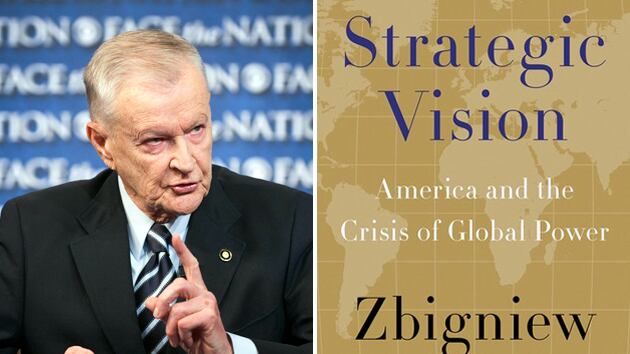In the vicinity of July 4, it’s probably imprudent to mention that America has lost its dominant position of world leadership, according to a renowned scholar of geopolitics, Zbigniew Brzezinski. He is as sturdily patriotic as anyone, but as a Cold Warrior, presidential adviser, and foreign-policy professor at Johns Hopkins, he has seen too much to follow the drum.
He went against the grain of elite opinion in the 50s by predicting that the Soviet Union was doomed to break up, and break up along nationalist lines; he foresaw the danger of allowing Ayatollah Khomeini to control the Iranian revolution and urged military action to forestall him; in the late 70s, he forecast the Soviet invasion of Afghanistan. He’s been so right on Soviet matters that it is downright disconcerting to read in his new book Strategic Vision: America and the Crisis of Global Power that America now exhibits the same symptoms of decay as the Soviet Union did just before its fall: a gridlocked governmental system incapable of enacting serious policy revisions, bankrupting itself with a gross military budget; failing in a decades-long attempt to control Afghanistan; a ruling class cynically insensitive to widening social disparities while hypocritically masking its own privileged lifestyle; and finally, in foreign affairs, becoming increasingly self-isolated while precipitating a geopolitically damaging hostility with China.

Brzezinski concedes this parallel may over drawn—there is the little matter of American freedom, for instance—but he is surely right that there is a dangerous new volatility. It doesn’t arise as it so often has in the past from the aggressive ambitions of a single big power (Germany, Italy, Japan, the Soviets in the 30s intimidating an ill-informed and irresolute West). What matters now, he argues, is the dispersal of power, rather than its concentration, the risks in regional collisions, the incapacity of any single power to deal with nuclear proliferation, financial contagion, climate change, global depression, vast demographic movements, and the dynamic political awakening of people worldwide.
The center of gravity has shifted from the West to the East. America is in decline. Europe is busy digging a bigger hole for itself. But China is on a trajectory to equal the U.S. in economic power by 2020 and lead the whole world by 2050. Its gross GDP was in 2010 way behind the U.S. and Europe, and lagged behind Japan, yet such is the speed of is growth from investment that by the time a Chinese boy today reaches pensionable age he will be a citizen of the world’s largest economic power (a gross GDP in trillions of $46, against $38 for the U.S., $26 for the European Union, with India ($15), Japan ($6), and Russia $4) trailing. The poverty of the vast peasant population means the average Chinese family will still be poorer than the American or the European but China’s voice, and military might, will be of enormous potential.
Brzezinski is by no means an alarmist of the “yellow-peril” strain in American history. Assuming that America is now incapable of vaulting back to global supremacy, he considers it unlikely that in the ensuring scramble, the world will be dominated by China or any other single preeminent successor. He commends both Chinese and American current policymakers for downplaying ideology while embracing a concept of “constructive partnership” in global affairs. His anxiety is whether our West, disunited and economically turbulent, can get its act together to be a balancer and conciliator between the new powers as Britain was in Europe during the 19th and early 20th centuries. If we could contrive a renewed and larger West—which we so signally failed to do in the 30s—he believes the U.S. can help a resurgent Asia avoid a struggle for regional domination by mediating conflicts and offsetting power balances among potential rivals. Otherwise as China grows and other emerging powers—Russia or India or Brazil—“compete with each other for resources, security, and economic advantage, the potential for miscalculation and conflict increases.”
With his experience as a national security adviser and author of perceptive foreign-policy treatises, Brzezinski offers a panoramic appraisal of the states he identifies as most geopolitically endangered: Pakistan, Afghanistan, Israel and the greater Middle East, Georgia, Taiwan, South Korea, Belarus, and Ukraine. He dismisses fundamentalist terrorism as unlikely to gain control of the upheavals in the Islamic world, which is comforting, but he is perhaps a little too sanguine that a nuclear Iran can be “assimilated into a process of regional accommodation.”
The central message of Strategic Vision is how much more ghastly it will be on all fronts if America cannot urgently mobilize a national will for renewal, not as a dominator but as sponsor of creative collaboration. He recognizes America’s potential; he is not a conventional declinist: “in every significant and tangible dimension of traditional power—military, technological, economic, and financial—America is still peerless.” What makes him angry is how the potential is being wasted. He condemns the “costly unilateralism of the younger Bush presidency” that led to a decade of war in the Middle East and the derailment of American foreign policy at large. He is scathing about the recklessness and greed of the financial systems that brought America low; disgusted by our ‘third-world’ infrastructure; appalled at how America has become “the most unequal major developed country in the world” with stagnation in social mobility; unsparing about the vitriolic partisan discourse feeding on an American populace “highly ignorant about the world”: over 30% of American adults cannot name two countries America fought in World War II.
Viewers of the HBO-Sorkin series, Newsroom, will be discomfited by the sight in episode 1 of the patriotic college girl being disabused by of her belief that America is the greatest success story in the world. But Jeff Daniels, in role as the anchorman repudiating her naivety with a fistful of negative statistics, may not be all that out of sync with the national mood manifest in the mass audiences currently for Superman genre of movies. All good men want to come to the aid of the parties so that somehow America recovers its mojo—to recover, as Brzezinski puts it, “the sense of purpose that imbued the country through different administrations and oscillations of power around the world.”






